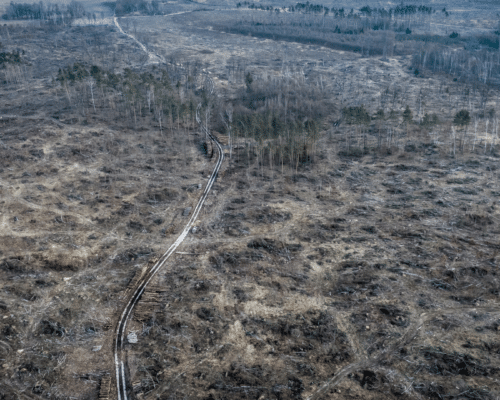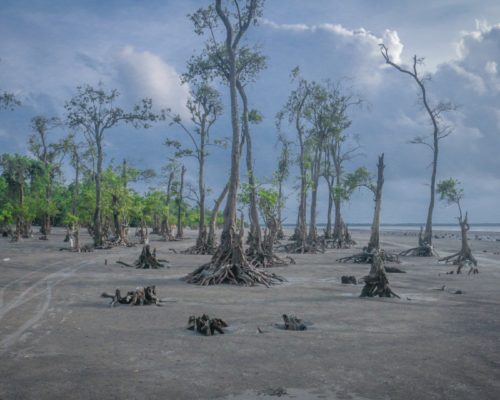Japan’s Ongoing Harm in the U.S. Gulf [Op-Ed]
Photo: Oil Change International
06 June 2024 – by Melanie Oldham
June 8 will mark the two-year anniversary of the Freeport LNG export terminal explosion that shook my family and my entire Freeport, Texas community. It was our small Gulf town’s worst nightmare: the explosion sent a fireball 450 feet into the sky, injuring those nearby and releasing almost 120,000 cubic feet of methane, carbon monoxide, benzene, and other highly toxic chemicals into the air. Despite the enormous blast, the company’s community warning system was never activated.
On the day of the explosion, Freeport LNG was 92 employees short, with operators working dangerous amounts of overtime. An engineer and plant manager advised the terminal to shut down due to technical problems just days before. The Freeport plant has struggled with operational issues.
Sadly, these kinds of operational errors are not unique. Just 200 miles away in Louisiana, the Cameron LNG terminal has experienced 67 toxic gas “spills” since its export operations began, an average of two per month, largely attributable to faulty equipment.
Even before these preventable disasters, the risk of cancer for me and my fellow Brazoria County residents was 22 times higher than EPA standards, given the long-term exposure to industrial pollution from petrochemical plants and refineries in the area. We face disproportionate rates of lung disease, preterm births, cardiovascular disease, and heightened stroke risk due to the cumulative impacts of these chemicals. The county’s air quality has consistently received an “F” grade from the American Lung Association.
As a long-term healthcare worker and mom, I’m confronted with these risks every day. After moving to Freeport, my children began to experience escalating health issues, including severe asthma. Now, they carry inhalers with them everywhere they go.
These LNG terminals have also devastated local fisheries: shrimp catch, a cornerstone of Louisiana’s diet and livelihoods, is nearly decimated. Further, methane, the primary component of LNG, is a whopping 80 times more potent than carbon dioxide and leaks from export terminals and across the supply chain, worsening the climate crisis.
Despite these risks and harm, the Cameron LNG facility is currently under consideration for expansion.
The main investor? Japan.
Japan is the largest public and private financier of U.S LNG export terminals. The Japan Bank for International Cooperation (JBIC) and Nippon Export and Investment Insurance provided $3.7 billion in financing for the Freeport LNG terminal. It invested even more – $4.5 billion – into the nearby Cameron LNG terminal. Japanese energy company JERA, one of the world’s top LNG importers, has a 25.7% interest in the Freeport LNG Development company.
The second anniversary of the Freeport explosion follows just a few days after the Japan Energy Summit. Sponsored by JERA and Tokyo Gas, the Japanese government and gas industry leaders gathered in Tokyo to spew more misinformation about LNG when it is just more investment in dirty energy. The Japanese government is driving gas expansion across Asia and globally, spending an average of $4.3 billion per year on gas worldwide.
At the Tokyo Summit, executives from JERA, big oil companies like ExxonMobil and Total, and the Japanese government stressed the “need” to expand gas while ignoring the devastation of communities like mine. Instead of learning from the Freeport explosion and investing in renewable energy infrastructure, Japan is doubling down by financing more gas projects and undermining energy security.
We don’t need any more LNG terminals or expansion projects. They are poisoning our communities, destroying our fragile coastal ecosystems and local economies, and derailing the global transition to clean energy.
The Biden administration’s pause on pending LNG export approvals is a positive step but is far from enough. Gulf towns like Freeport are ticking time bombs. As the largest historical contributor to the climate crisis and the world’s largest LNG exporter, the U.S. is obligated to stop expanding LNG and support a full, fast, fair, and funded phase-out of fossil fuels.
Over the last two years, our requests to meet with Freeport LNG, the plant owner and operator, and its billionaire CEO, Michael Smith, have been disappointingly – yet unsurprisingly – met with total silence.
We on the Texas and Louisiana coasts should not have to shoulder the harm and risks from LNG pollution one more day. We call on Japanese and all other financiers to reject the construction or expansion of LNG terminals here or anywhere. Despite the greenwashing at the Japanese Energy Summit and beyond, we refuse to be sacrificed for fossil fuel profits.
Melanie Oldham is the Founder and Director of Better Brazoria: Clean Air & Water, a frontline environmental justice organisation based in Freeport, Texas. She lives a few miles from Freeport LNG Liquefaction Facility on Quintana Island.
About Better Brazoria
Better Brazoria: Clean Air & Water is a 501c3 non-profit organisation in Freeport, Texas, Brazoria County, that does community outreach and education and advocates for the environment, public health, and quality of life to local, state, and federal governments.
Disclaimer: The views and opinions expressed in this article are those of the author and do not necessarily reflect the official policy or position of Energy Tracker Asia.







